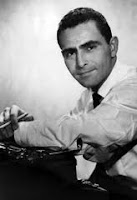 | |
| Don't let the charming font and sleigh ride fool you. |
 |
| Rod Serling |
 |
| Joseph L. Makiewicz |
 |
| Ben Gazzara and Sterling Hayden |
The Spirit of Christmas Past, a universal soldier, takes Grudge back to the first world war aboard a battleship filled with military coffins. Grudge's gut reaction is understandable -- what's the point of sending our sons to fight another's conflict, especially one as pointless as the war that was supposed to make the world safe for democracy? The Spirit agrees, up to a point: if we don't talk to the other side, we at least have to stop the enemy before he starts a world conflict. As he reminds Grudge:
When ol' Adolf marched into the Rhineland, France didn't want to get involved. Italy pulled down the windowshade when Hitler took Austria. England wasn't about to involve itself when Czechoslovakia went under. And Russia kept the phone off the hook when Poland was destroyed. Everybody was saying, "Don't rock the boat." But it sank slowly to the bottom. So [our troops] died in other places on other dates.The monologue is vintage Serling -- colorful, character-driven, just close enough to over-the-top to catch your attention. Grudge, however, is unmoved until taken to his own past, when, as a navy commander, he visited Hiroshima in the weeks following the end of World War II. There he sees a group of schoolgirls whose faces were terribly burned by the flash of the atomic bomb. Only through the horrified reaction of his driver (Eva Marie Saint) does Grudge finally consider the destruction around him in human, rather than military, terms.
 |
| Steve Lawrence with Sterling Hayden |
The portrayal of the Spirit of Christmas Present is different from those in other versions. This guy isn't a jolly good fellow, but a selfish glutton who feasts on a football field-length meal while next to a barbed wire-enclosed concentration camp filled with the displaced victims of war. Grudge, his humanity finally stirred, is aghast: "How can you sit there and eat like that when these people are starving?" The Spirit turns off a light with the snap of his fingers, making the victims invisible: "Feel better?" he asks. Thanks to Serling's subversive talent, the Spirit is both a stand-in for and speaking to us. Pat Hingle, one of those "oh that guy" character actors, gives an intense performance as the Spirit, not for a second letting Grudge, or the viewers, off the hook.
 |
| Pat Hingle |
 |
| Robert Shaw |
Sellers' entrance probably makes for a welcome change to most viewers -- Finally, some laughs! -- dressed as he is in a cheap ten-gallon hat and Pilgrim-style jacket, carried on the shoulders of football players while, in a parody of Beatlemania, greeted by the frenzied screams of teenage girls.
The subsequent speech could have been dramatic from the get-go if delivered by another actor. It's the mindboggling genius of Sellers, however, that makes the double-talking dictator's first spoken words sound darkly humorous when delivered in an accent wavering between good-ol' boy and flat mid-American: "I am the Imperial Me. And this is the non-government of the Me people!"
 |
| Peter Sellers |
Sellers responds to the mob's crazed "Hallelujah" and "Me me me me!" with -- and there's no other way of putting this -- orgasmic joy. And it's here that the scene, and the actor himself, quickly become unnerving. His face taking up almost the whole screen and voice dropping a tone, he is no longer Peter Sellers but Imperial Me himself, and it is a scary thing. His role lasting just a few minutes, Sellers not only gives the performance of a lifetime (in a lifetime filled with great performances) but one that foreshadows, to a remarkable degree, the era of Tea Party and evangelical politics.
Only one survivor, Grudge's butler, sees through the madness, imploring the mob to stop fighting and start talking -- it's the only way Mankind has any chance of renewing itself. For his troubles, he's given an unexpected, shocking rejoinder, one that made me gasp aloud. No wonder they originally aired this three days after Christmas, I thought. The entire scene must have disturbed the hell out of TV viewers who, at the time, were more used to talking horses, rich hillbillies and Gomer Pyle.
 |
| The TV Guide listing for December 28, 1964. "Drama" is right. |
There's always the chance an enthusiastic review oversells a product. So let me warn you, the movie isn't perfect. Much of Sterling Hayden's dialogue is heavy-handed (see "Rod Serling and sledgehammer" comment above). Ben Gazzara just goes through the motions. And the production flirts with the self-important vibe prevalent in "message" pictures of its time.
Hey, for all I know, I could be W-to-the-G wrong about the whole thing, and it's just a family-sized portion of overheated '60s agitprop. After all, it was produced to commemorate the anniversary of the United Nations -- which has done such a bang-up job of curbing despots and preventing wars ever since.
But if for no other reason than its rarity, Carol for Another Christmas is an absolute must-see. Besides, where else are you going to watch Steve Lawrence and Peter Sellers in the same movie?
******************************
No comments:
Post a Comment